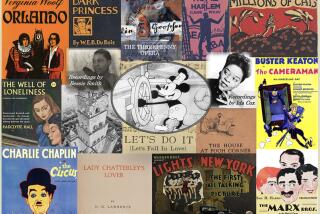Granting of Broad Patent Stuns Multimedia Industry : Technology: Rival firms say Compton’s New Media will have unfair advantage. Legal challenges are likely.
- Share via
Shock and incredulity spread through the burgeoning multimedia industry Tuesday after a Carlsbad, Calif., company revealed that it had won a broad patent on multimedia technology and will charge a fee to anyone who wants to employ it.
Competitors expressed astonishment at the scope of the patent, asserting that it would have a chilling effect on an industry just emerging from its infancy and give the patent winner, Compton’s New Media, an unfair advantage in a potential multibillion-dollar field.
The patent also could mean another toll for consumers trying to navigate the soon-to-come information highway. Much of what is expected to travel on that highway falls into the broad category of multimedia--the mixing of sound, images and text--and thus might be covered by the patent.
Moreover, the Compton’s patent is so broad that it raises questions about whether the federal patent system as it exists is suited to the challenges posed by the information revolution.
“The entire industry should rise up and throw fruit in the direction of Compton’s,” said Stan Cornyn, who started what is now Time Warner’s multimedia group in Burbank. “It’s like trying to patent a watermelon.”
Multimedia developers and patent attorneys predicted swift challenges to the patent. But if it stands, it could help Compton’s grow into a giant that gets a piece of every multimedia sale.
Compton’s insists it wants the industry to grow and says it will keep its license fees modest, charging 1% of net sales until June and possibly as much as 3% after that.
Software developers “historically do not like to pay licensing fees,” said Norman Bastins, Compton’s general manager. “But it’s time for the industry to grow up. If people are going to invest in this industry as they do in others, they need to be protected.”
At issue for competitors is the patent’s stunning breadth. It appears to cover the entire search and retrieval process at the heart of multimedia software on personal computers. Sales of this software, usually sold on compact discs known as CD-ROMs, are soaring, with consumers snapping up talking encyclopedias, travel works and other titles.
Compton’s believes its patent applies to any product that links databases of text and graphics. That includes nearly all interactive CD-ROMs on the market today. And the company says many future interactive television applications are covered as well.
Not all complaints are directed at Compton’s. Some patent attorneys and others contend that the U.S. Patent Office does not understand complex new technologies such as interactive multimedia and that issuing broad patents in a fledgling industry will stifle innovation.
“The patent office is granting these very general and broad patents without investigating or having any real knowledge of the technology or the marketplace,” said Philip Dodds, executive director of the Annapolis, Md.-based Interactive Multimedia Assn., whose phones were ringing off the hook Tuesday, the day after the Compton’s announcement. “It’s providing a chilling effect to developers and product makers.”
Such broad high-technology patents are not unprecedented. In 1990, after 20 years of litigation, Gilbert P. Hyatt was awarded a patent for inventing the microprocessor that spawned the computer revolution. And Magnavox owns a patent for the technology used to make video game screens scroll.
Annual CD-ROM sales in the United States are about $400 million now, but the industry is growing fast, and profit are expected to balloon as multimedia begins to be pumped through fiber-optic cables into homes.
A successful CD-ROM title sells 50,000 to 60,000 copies that retail for $50 to $60, and a typical title costs from $500,000 to $2 million to produce. Industry estimates are that by the end of this year 1.5 million CD-ROM drives will be located in U.S. homes. That number is expected to reach 10 million over the next four years.
One of the first companies to experiment with interactive multimedia, Compton’s is already the largest player in the field with annual sales of $30 million. That total is expected to double this year. The company is best known for its multimedia encyclopedia, which squeezes 27 volumes onto one disc, complete with photos, sound and video animation, as well as text.
Originally owned by Encyclopedia Britannica Inc., the firm was sold to Tribune Publishing Co. for $57 million in September. Company officials said the patent--awarded in August--was a significant issue in those negotiations. The patent covers multimedia programs that retrieve text, photos, sound, animation and video information from multimedia databases.
The chief grievance against Compton’s is that dozens of other companies have been using similar technology for years--they just have not gone through the legal procedure to patent it.
“My guess is that it applies to things we invented and put into practice 10 years ago,” said Bob Stein, co-founder of Voyager Co., a New York-based multimedia publisher.
Media Vision’s Cornyn said “The Magic Flute,” the first CD-ROM title he produced for Warner Bros. in the mid-1980s, used a search and retrieval system similar to the one Compton’s has patented.
“People have been coming up with these kinds of ideas for years,” said Janice Maloney, senior editor of the newsletter Digital Media.
Richard Thompson, an attorney specializing in entertainment and multimedia, said several of his clients are concerned about the Compton’s announcement.
“It’s inevitable that there will be challenges,” said Thompson, of the Los Angeles-based firm Silverberg, Katz, Thompson & Braun. “The only question is how quickly and by whom.”
Microsoft, another major player in the CD-ROM business, is a likely challenger. The software concern said its attorneys are reviewing the patent.
But Joseph Clark, chief executive of Seattle-based Video Discovery, a $7-million-a-year firm specializing in educational multimedia, was unequivocal. Clark is challenging a narrower multimedia patent awarded to Optical Data Corp. in federal court, claiming that the patent office does not know enough about the new industry to issue patents on it.






